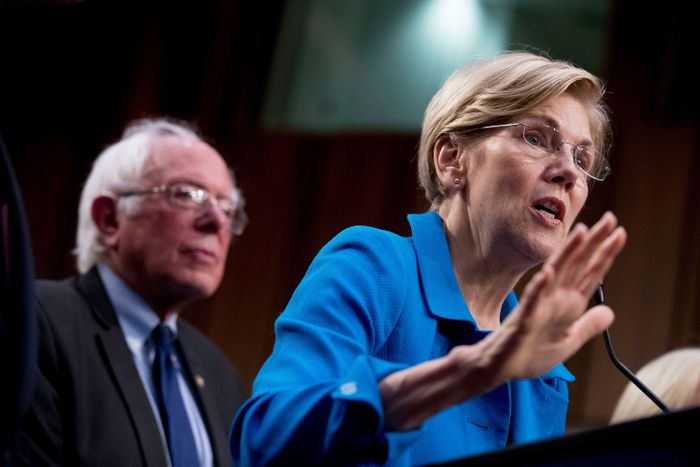
Presidential campaigns are generally where an American political party’s foreign policy messages are worked out and divisions are explored or resolved. For Democrats, there are already signs that eight years of largely deferring to Barack Obama and two years of focus on domestic policy under Donald Trump are coming to an end as the party’s potentially huge 2020 presidential field takes shape. The immediate flash point illuminating this transition is the suddenly pervasive Democratic resistance to the U.S.-backed Saudi war in Yemen, exacerbated by the Saudi murder of journalist Jamal Khashoggi. This was a war pursued steadfastly by the Obama administration and supported by Hillary Clinton. Now, as The Atlantic’s Peter Beinart points out, Bernie Sanders’s resolution to utilize the War Powers Act to end most U.S. operations in Yemen is no longer controversial:
[W]hen Sanders’s legislation came up again [last week], every Democrat who had voted against it in March flipped and voted to discharge the bill from committee. Powered by unanimous Democratic support, the move to discharge the bill passed.
But underlying this consolidation of opinion is something more profound:
In explaining their decision to invoke the War Powers Act, Democratic staffers I talked to explicitly compared this period with the era in which it was introduced: the final years of the Vietnam War.
By 1973, when Congress passed the War Powers Act, the Cold War was thawing: Richard Nixon’s administration was pursuing a détente with the Soviet Union and an opening to China. As the hysteria eased, liberals pursued two goals. First, they tried to restore congressional oversight of foreign policy after decades in which fear of communism had enabled the rise of an “imperial presidency….”
[Second,] [t]hey were trying to remove anti-communism from its central position in American foreign policy.
Beinart thinks Democrats are now similarly shifting away from the basic foreign policy orientation of both parties since 9/11:
Democrats pushing a War Powers Resolution on Yemen want not merely to expand oversight of the Pentagon’s sprawling anti-terrorism operations, but to reorient American foreign policy away from terrorism altogether.
This reorientation within the Democratic Party has been in progress for quite some time, beginning with the opposition of many Democrats to George W. Bush’s disastrous Iraq War, and becoming more general as most Democrats objected to Bush’s global war on terrorism framing of U.S. foreign policy (Obama, notably, refused to use that terminology). Now the Yemen war has pushed the evolution further as Democrats no longer think in terms of basing much of U.S. foreign policy on anti-terrorist alliances with Israel and conservative Arab regimes like Saudi Arabia at the expense of every other principle. A corollary will likely be the final Democratic abandonment of support for the endless war in Afghanistan, which Obama actually escalated. And while support for Israel’s security needs will almost certainly remain standard for most Democrats, it will not extend to the Trump administration’s vision of a Greater Israel acting as an aggressive regional counterweight to Iran in implicit alliance with the Saudis.
Splitting with Republicans on Yemen, the Middle East, Afghanistan, or even the primacy of anti-terrorism efforts is one thing; articulating a positive foreign policy is another altogether, and that’s where the 2020 presidential campaign comes in. Two proto-candidates, Bernie Sanders and Elizabeth Warren, have already delivered major foreign policy addresses aimed at laying out a progressive alternative to Trump’s America First stylings. Both deplore endless wars, excessive defense spending, and the power of elites at home and abroad in shaping the world order. They differ in some important particulars: Sanders contemplates a more central role for the United Nations, while Warren wants a renewed and revised alliance system. But in general, their foreign policy views are as different from those of, say, John Kerry circa 2004 as George McGovern’s in 1972 differed from Hubert Humphrey’s in 1968.
As it happens, the tone of Sanders’s and Warren’s foreign policy visions nicely fits their perceived positions on the spectrum of Democratic ideology generally, with Sanders holding down the left end and Warren occupying ground more to the center. Peter Beinart probably exaggerates in identifying Sanders with Henry Wallace and Warren with Harry Truman in the great intra-Democratic debate at the beginning of the Cold War (which Truman emphatically won). But they differ enough to begin a real debate, and it will be interesting to see whether other 2020 candidates choose to distinguish themselves on foreign policy issues or remain obsessed with universal health-care blueprints, progressive tax plans, and variations on the theme of “I’ll be tougher on Trump.” Does the shift on Yemen truly mark the end of Democratic acquiescence to the primacy of anti-terrorism as the prime national interest we are defending with our almost unbelievably elaborate and expensive national security structure? Or will someone in the 2020 field (perhaps Joe Biden?) revive the ancient tradition of Democratic hawks? The answer to that question could be key to separating sheep from goats as Democrats struggle to winnow their presidential options.






























